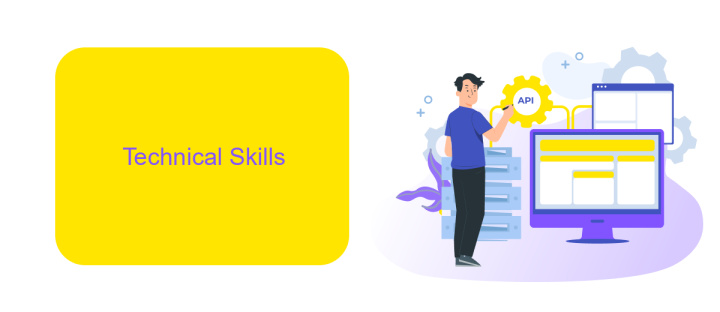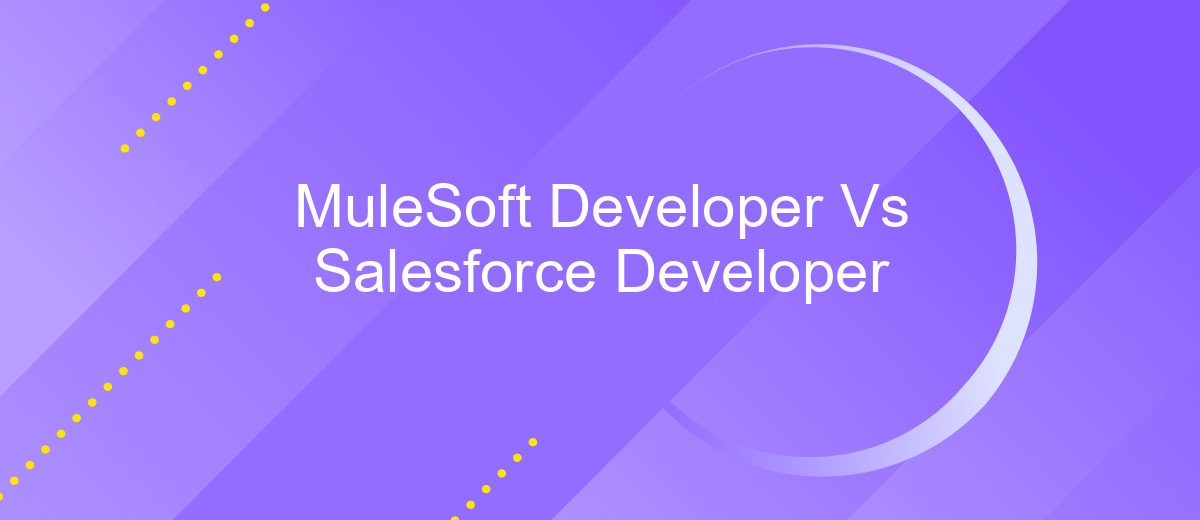MuleSoft Developer Vs Salesforce Developer
In today's rapidly evolving tech landscape, the roles of MuleSoft Developer and Salesforce Developer are becoming increasingly pivotal. Both positions offer unique opportunities and challenges, yet they cater to different aspects of business integration and customer relationship management. This article delves into the key differences, skill sets, and career prospects for aspiring professionals in these dynamic fields.
Job Responsibilities
Both MuleSoft and Salesforce Developers play crucial roles in the digital transformation of businesses, albeit with different focuses. MuleSoft Developers are primarily responsible for building and managing APIs and integrations, ensuring seamless data flow between various systems. On the other hand, Salesforce Developers focus on customizing and extending the Salesforce CRM platform to meet specific business needs.
- MuleSoft Developers design, build, and maintain APIs using MuleSoft's Anypoint Platform.
- They integrate different systems and applications, often utilizing services like ApiX-Drive for streamlined integration processes.
- Salesforce Developers customize the Salesforce platform using Apex, Visualforce, and Lightning components.
- They develop custom applications and workflows to enhance business processes within Salesforce.
- Both roles require a solid understanding of software development principles and the ability to troubleshoot and optimize their respective systems.
While MuleSoft Developers ensure that various software systems can communicate effectively, Salesforce Developers focus on maximizing the utility of the Salesforce platform. Both roles are essential for leveraging technology to drive business success, requiring a mix of technical skills and strategic thinking.
Technical Skills

MuleSoft Developers are proficient in designing and implementing integration solutions using MuleSoft's Anypoint Platform. They excel in API-led connectivity, enabling seamless communication between various systems and applications. Their technical skills include expertise in DataWeave, MuleSoft's powerful data transformation language, and experience with RAML (RESTful API Modeling Language) to define APIs. Additionally, they are adept at using ApiX-Drive for automating and streamlining integration processes, ensuring efficient data flow and synchronization across different platforms.
Salesforce Developers, on the other hand, specialize in customizing and extending the Salesforce platform. They are skilled in Apex, Salesforce's proprietary programming language, and Visualforce for creating custom user interfaces. Their technical toolkit also includes Lightning Web Components (LWC) for building modern web applications within Salesforce. Salesforce Developers are experienced in using tools like ApiX-Drive to integrate Salesforce with other systems, enhancing the platform's functionality and ensuring seamless data exchange. They are also proficient in using Salesforce's declarative tools, such as Process Builder and Flow, to automate business processes.
Education and Certifications

Both MuleSoft and Salesforce developers require a strong educational background in computer science, information technology, or a related field. A bachelor's degree is typically the minimum requirement, although some positions may prefer candidates with a master's degree or higher.
Key certifications for MuleSoft Developers include:
- MuleSoft Certified Developer - Level 1 (Mule 4)
- MuleSoft Certified Integration Architect - Level 1
- MuleSoft Certified Platform Architect - Level 1
Key certifications for Salesforce Developers include:
- Salesforce Certified Platform Developer I
- Salesforce Certified Platform Developer II
- Salesforce Certified Technical Architect
In addition to these certifications, knowledge of integration tools such as ApiX-Drive can be advantageous. ApiX-Drive is a service that simplifies the integration process, making it easier for developers to connect various applications and automate workflows. Continuous learning and staying updated with the latest technologies and tools are crucial for both MuleSoft and Salesforce developers to remain competitive in the field.
Career Path and Salary

The career path for MuleSoft and Salesforce developers offers distinct opportunities and challenges. MuleSoft developers focus on integrating various systems, applications, and data sources using the MuleSoft Anypoint Platform. They often work with APIs and middleware to ensure seamless data flow across an organization. On the other hand, Salesforce developers specialize in customizing and extending the Salesforce platform, often working with Apex, Visualforce, and Lightning components to create tailored solutions for business needs.
Both roles require a strong foundation in programming and problem-solving skills, but their focus areas differ significantly. MuleSoft developers need expertise in API management and integration patterns, while Salesforce developers must be proficient in Salesforce-specific languages and tools.
- MuleSoft Developer: Average salary ranges from 0,000 to 0,000 annually.
- Salesforce Developer: Average salary ranges from ,000 to 0,000 annually.
Choosing between these career paths depends on your interests and career goals. If you enjoy working on integration projects and ensuring smooth data flow, a MuleSoft developer role might be ideal. If you prefer customizing CRM solutions and building business-specific applications, a Salesforce developer role could be more suitable. Both paths offer lucrative salaries and opportunities for growth in the tech industry.
Summary
The roles of MuleSoft Developer and Salesforce Developer, while both integral to modern business operations, focus on different aspects of system integration and application development. MuleSoft Developers specialize in creating seamless integrations between various systems and applications using the MuleSoft Anypoint Platform. They are adept at designing APIs and ensuring data flows smoothly across different platforms. Tools like ApiX-Drive can further simplify these integrations, making the process more efficient and reliable.
On the other hand, Salesforce Developers focus on customizing and extending the capabilities of the Salesforce platform. They develop custom applications using Apex, Visualforce, and Lightning components to meet specific business needs. While both roles require strong programming skills and an understanding of business processes, MuleSoft Developers are more oriented towards integration solutions, whereas Salesforce Developers concentrate on enhancing the functionalities within the Salesforce ecosystem. Both roles are crucial for optimizing business processes and ensuring efficient data management.


FAQ
What are the primary responsibilities of a MuleSoft Developer?
What are the main tasks of a Salesforce Developer?
Can a MuleSoft Developer transition to a Salesforce Developer role easily?
Which role is more suitable for handling complex integrations?
What tools are commonly used by MuleSoft Developers and Salesforce Developers for automation and integration?
Do you want to achieve your goals in business, career and life faster and better? Do it with ApiX-Drive – a tool that will remove a significant part of the routine from workflows and free up additional time to achieve your goals. Test the capabilities of Apix-Drive for free – see for yourself the effectiveness of the tool.

